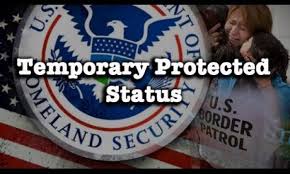
Temporary Protected Status (TPS) is a form of humanitarian relief which applies to certain nationals of particular countries who were present in the US during a designated period of time.
For example, if there is war or an environmental disaster occurring in your country, the Department of Homeland Security (DHS) may decide to grant certain nationals of your country TPS in the US. On this page, we also explain how to get a work card and a travel permit under Temporary Protected Status.
- Judge Blocks DHS’s Termination of Venezuelan TPS (4-2-25)
- Trump administration revokes deportation protections for 600,000 Venezuelans (1-29-25)
Which countries have TPS?
As of December 2024, the following 17 countries were designated for TPS:
- Afghanistan (Extended until May 20, 2025)
- Burma (Valid through November 25, 2025)
- Cameroon (Extended until June 7, 2025)
- El Salvador (Extended until March 9, 2025)
- Ethiopia (Valid through December 12, 2025)
- Haiti (Extended through February 3, 2026)
- Honduras (Extended until July 5, 2025)
- Lebanon (Valid through May 27, 2026)
- Nepal (Extended until June 24, 2025)
- Nicaragua (Extended until July 5, 2025)
- Somalia (Extended until March 17, 2026)
- South Sudan (Extended until May 3, 2025)
- Sudan (Extended until April 19, 2025)
- Syria (Extended until September 30, 2025)
- Ukraine (Extended until April 19, 2025)
- Venezuela (Extended until April 2, 2025)
- Yemen (Extended until March 3, 2026)
Client Reviews

A Life Changing Law Firm
“My family and I were clients of Mr. Carl Shusterman and I can honestly say that he had a tremendous impact on our lives - a very positive one. Even when my parents had been denied and they had been told to pack and get out of this country, Mr. Shusterman rushed to find an alternative in order to ensure that my parents could stay.”
- Diana Cabrera, Reno, Nevada
Read More Reviews
Zoom Consultations Available!
Persons granted TPS cannot be deported from the US, are eligible to apply for an EAD work permit and may be granted an Advance Parole travel permit.
Use form I-821 to apply for TPS, form I-765 to apply for a work permit and form I-131 to apply for a travel permit.
Although TPS is a temporary benefit which does not automatically lead to a green card, if you are eligible, you are not prohibited from applying for permanent residence, temporary visa status or any other immigration status.
In July 2022, USCIS rescinded its designation of the AAO decision in Matter of Z-R-Z-C- as an adopted decision and updates it interpretation of the effects of authorized travel by TPS beneficiaries. This memo supersedes the prior USCIS Policy Manual regarding the treatment of a TPS beneficiary’s return after authorized travel abroad.
USCIS updated it guidance as follows:
- USCIS will no longer use the advance parole mechanism to authorize travel for TPS beneficiaries, but will instead provide a new TPS travel authorization document. This document will serve as evidence of the prior consent for travel contemplated in INA 244(f)(3) and serve as evidence that the bearer may be inspected and admitted into TPS pursuant to MTINA if all other requirements are met.
- TPS beneficiaries whom DHS has inspected and admitted into TPS under MTINA, subsequent to that inspection and admission, will have been “inspected and admitted” and are “present in the United States pursuant to a lawful admission,” including for purposes of adjustment of status under INA 245. This is true even if the TPS beneficiary was present without admission or parole when initially granted TPS.
Here is what the USCIS website says about TPS:
The Secretary of Homeland Security may designate a foreign country for TPS due to conditions in the country that temporarily prevent the country’s nationals from returning safely, or in certain circumstances, where the country is unable to handle the return of its nationals adequately. USCIS may grant TPS to eligible nationals of certain countries (or parts of countries), who are already in the United States. Eligible individuals without nationality who last resided in the designated country may also be granted TPS.
The Secretary may designate a country for TPS due to the following temporary conditions in the country:
- Ongoing armed conflict (such as civil war)
- An environmental disaster (such as earthquake or hurricane), or an epidemic
- Other extraordinary and temporary conditions
During a designated period, individuals who are TPS beneficiaries or who are found preliminarily eligible for TPS upon initial review of their cases (prima facieeligible):
- Are not removable from the United States
- Can obtain an employment authorization document (EAD)
- May be granted travel authorization
Once granted TPS, an individual also cannot be detained by DHS on the basis of his or her immigration status in the United States.
TPS is a temporary benefit that does not lead to lawful permanent resident status or give any other immigration status. However, registration for TPS does not prevent you from:
- Applying for nonimmigrant status
- Filing for adjustment of status based on an immigrant petition
- Applying for any other immigration benefit or protection for which you may be eligible
PLEASE NOTE: To be granted any other immigration benefit you must still meet all the eligibility requirements for that particular benefit. An application for TPS does not affect an application for asylum or any other immigration benefit and vice versa. Denial of an application for asylum or any other immigration benefit does not affect your ability to register for TPS, although the grounds of denial of that application may also lead to denial of TPS.
Government TPS Resources by Country
- Afghanistan
- Burma
- Cameroon
- El Salvador
- Ethiopia
- Guinea
- Haiti
- Honduras
- Liberia
- Nepal
- Nicaragua
- Sierra Leone
- Somalia
- Sudan
- South Sudan
- Syria
- Ukraine
- Venezuela
TPS – Eligibility to Adjust Status
If they are otherwise eligible, TPS holders can apply for a green card and adjust from their temporary status to lawful permanent residence (LPR) status. Like other prospective immigrants, TPS holders can adjust status though family-based or employment based green card categories.
To be eligible for a green card, TPS holders must be considered “inspected and admitted” or “paroled” by USCIS. In the 2020 case Sanchez v. Mayorkas, the Supreme Court held that obtaining status through TPS is not enough on its own to establish that an individual has been “inspected and admitted.” As a result, individuals who have TPS who initially entered the country without inspection do not meet the prerequisite criteria of having been “inspected and admitted” for green card eligibility. However, the Supreme Court did not rule on whether TPS holders who have re-entered the country after traveling under advanced parole are considered “inspected and admitted” or “paroled” for the purposes of adjustment of status.
Temporary Protected Status: Additional Resources
- Temporary Protected Status (TPS) (USCIS)
- Temporary Protected Status (TPS) and Deferred Enforced Departure (DED) – (CLINIC)








